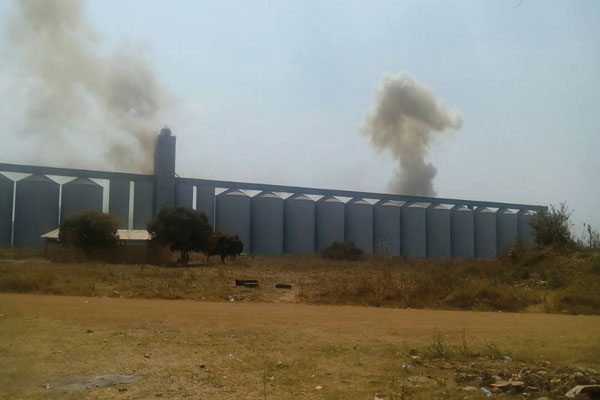
THE recent explosion that rocked Lions’ Den Grain Marketing Board (GMB) silos close to the Harare-Chirundu Highway following a still-to-be investigated cause of a fire outbreak, killing at least four people and seriously injuring three, brings to the fore the fact that accidents in the field and on the farm require as much attention as the appalling lack of safety elsewhere in the food chain.
BY TONDERAYI MATONHO

The incident left a lot of people shocked, with many calling on the government to speed up the investigation and help come up with measures that will be able to plague any future incidences of such magnitude.
During a visit to Banket this week, several workers at the Lions’ Den Grain Marketing Board silos were still struggling to come to terms with what really happened.
Others told NewsDay that this bore testimony to the current state of the poor infrastructure at the country’s grain depots. Others just looked away or simply wept silently and refused to speak.
“We are at pains believing and understanding what and how this happened after having worked here for many years, with no such level of accidents having occurred,” said one of the workers.
“We urge the government to investigate and establish the cause so that such sad incidents are avoided in the future.”
A farm manager, who identified himself as Jesse, who works at a farm adjacent to the silos, claimed that the tragic incident bordered on the long-entrenched negligence of the depot infrastructure.
- Chamisa under fire over US$120K donation
- Mavhunga puts DeMbare into Chibuku quarterfinals
- Pension funds bet on Cabora Bassa oilfields
- Councils defy govt fire tender directive
Keep Reading
“These silos are too old and this is a reflection of their poor state through negligence and lack of rehabilitation and repair.”
Harare-based civil engineer Felix Tunha concurred: “As long as the structural defects in these silos are not attended to, we should certainly know that we are sitting on a serious time bomb. Large amounts of water have been percolating through the silos for five years or more and authorities still claim it’s business as usual.”
The deplorable state of the silos has not escaped the attention of the government’s Comptroller and Auditor-General Mildred Chiri’s recent reports.
The government chief auditor has noted in her reports on the state of parastatals and enterprises that most of the grain silos have since “suffered neglect and greatly required long over-due service and exposed workers to unexpected accidents”.
A 2015 regional study done by a researcher in health and safety in agriculture, Dingani Moyo, revealed the need to prioritise safety.
“All along the food chain, from the plough, tractor, silo and plate, there is scant respect for the safety of those who produce and process food – the farm worker,” Moyo said. “Their health and safety is vital, and not only for themselves because without a safe production process, without safe producers, there are no safe consumers.”
According to estimates from the International Labour Office (ILO), about half of the world’s 250 million workplace injuries are estimated to occur in agriculture. Each year, worldwide, 180 000 workers are killed in the agricultural sector.
A government agricultural extension and technical specialist working in Harare said much of the work in farms was seasonal and workers were “in frequent or constant contact with fires, animals and plants, and are exposed to burns, suffocation, bites, poisoning, infections, parasitic diseases, allergies and toxicity.”
With production and processing intensifying, those agencies and legislative bodies which provide enabling environments are failing to accompany these changes with appropriate information, training and safety legislation, according to the ILO.
The world labour organisation further notes that there are about 20 conventions on occupational health and safety (OHS) that have been adopted by governments, employers and workers’ organisations which comprise the ILO.
Countries such as Sweden and Finland have ratified 85% or more, with most developing countries, including Zimbabwe, having signed and ratified at most six.
Inclusion of national safety bodies in agricultural policy formulation and implementation and the establishment of an overall legislative framework and full adoption of the ILO Convention, are other critical measures needed to promote OSH.











